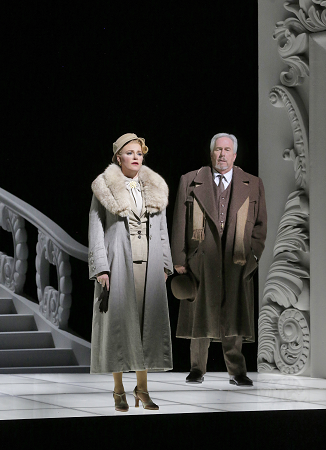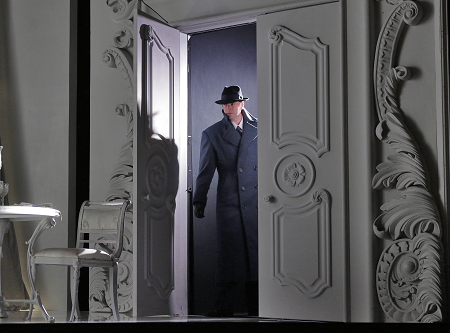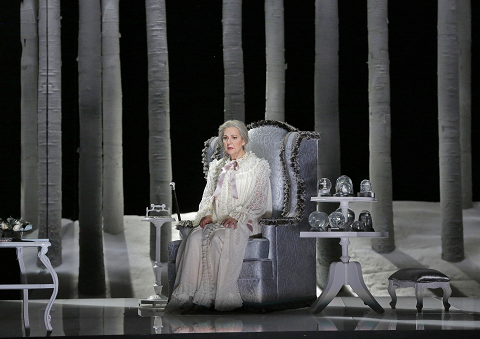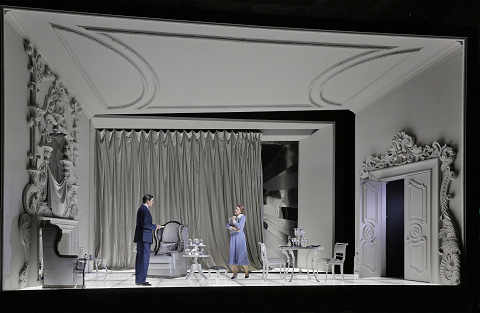
09 Aug 2016
Coolly Elegant Vanessa in the Desert
Molten passions were seething just below the icy Nordic exterior of Santa Fe Opera’s wholly masterful production of Barber’s Vanessa.
English Touring Opera are delighted to announce a season of lyric monodramas to tour nationally from October to December. The season features music for solo singer and piano by Argento, Britten, Tippett and Shostakovich with a bold and inventive approach to making opera during social distancing.
This tenth of ten Live from London concerts was in fact a recorded live performance from California. It was no less enjoyable for that, and it was also uplifting to learn that this wasn’t in fact the ‘last’ LfL event that we will be able to enjoy, courtesy of VOCES8 and their fellow vocal ensembles (more below …).
Ever since Wigmore Hall announced their superb series of autumn concerts, all streamed live and available free of charge, I’d been looking forward to this song recital by Ian Bostridge and Imogen Cooper.
Although Stile Antico’s programme article for their Live from London recital introduced their selection from the many treasures of the English Renaissance in the context of the theological debates and upheavals of the Tudor and Elizabethan years, their performance was more evocative of private chamber music than of public liturgy.
Evidently, face masks don’t stifle appreciative “Bravo!”s. And, reducing audience numbers doesn’t lower the volume of such acclamations. For, the audience at Wigmore Hall gave soprano Elizabeth Llewellyn and pianist Simon Lepper a greatly deserved warm reception and hearty response following this lunchtime recital of late-Romantic song.
For this week’s Live from London vocal recital we moved from the home of VOCES8, St Anne and St Agnes in the City of London, to Kings Place, where The Sixteen - who have been associate artists at the venue for some time - presented a programme of music and words bound together by the theme of ‘reflection’.
'Such is your divine Disposation that both you excellently understand, and royally entertaine the Exercise of Musicke.’
‘And there was war in heaven: Michael and his angels fought against the dragon; and the dragon fought and his angels, And prevailed not; neither was their place found any more in heaven … that old serpent … Satan, which deceiveth the whole world: he was cast out into the earth, and his angels were cast out with him.’
There was never any doubt that the fifth of the twelve Met Stars Live in Concert broadcasts was going to be a palpably intense and vivid event, as well as a musically stunning and theatrically enervating experience.
‘Love’ was the theme for this Live from London performance by Apollo5. Given the complexity and diversity of that human emotion, and Apollo5’s reputation for versatility and diverse repertoire, ranging from Renaissance choral music to jazz, from contemporary classical works to popular song, it was no surprise that their programme spanned 500 years and several musical styles.
The Academy of St Martin in the Fields have titled their autumn series of eight concerts - which are taking place at 5pm and 7.30pm on two Saturdays each month at their home venue in Trafalgar Square, and being filmed for streaming the following Thursday - ‘re:connect’.
The London Symphony Orchestra opened their Autumn 2020 season with a homage to Oliver Knussen, who died at the age of 66 in July 2018. The programme traced a national musical lineage through the twentieth century, from Britten to Knussen, on to Mark-Anthony Turnage, and entwining the LSO and Rattle too.
With the Live from London digital vocal festival entering the second half of the series, the festival’s host, VOCES8, returned to their home at St Annes and St Agnes in the City of London to present a sequence of ‘Choral Dances’ - vocal music inspired by dance, embracing diverse genres from the Renaissance madrigal to swing jazz.
Just a few unison string wriggles from the opening of Mozart’s overture to Le nozze di Figaro are enough to make any opera-lover perch on the edge of their seat, in excited anticipation of the drama in music to come, so there could be no other curtain-raiser for this Gala Concert at the Royal Opera House, the latest instalment from ‘their House’ to ‘our houses’.
"Before the ending of the day, creator of all things, we pray that, with your accustomed mercy, you may watch over us."
The doors at The Metropolitan Opera will not open to live audiences until 2021 at the earliest, and the likelihood of normal operatic life resuming in cities around the world looks but a distant dream at present. But, while we may not be invited from our homes into the opera house for some time yet, with its free daily screenings of past productions and its pay-per-view Met Stars Live in Concert series, the Met continues to bring opera into our homes.
Music-making at this year’s Grange Festival Opera may have fallen silent in June and July, but the country house and extensive grounds of The Grange provided an ideal setting for a weekend of twelve specially conceived ‘promenade’ performances encompassing music and dance.
There’s a “slide of harmony” and “all the bones leave your body at that moment and you collapse to the floor, it’s so extraordinary.”
“Music for a while, shall all your cares beguile.”
The hum of bees rising from myriad scented blooms; gentle strains of birdsong; the cheerful chatter of picnickers beside a still lake; decorous thwacks of leather on willow; song and music floating through the warm evening air.

Molten passions were seething just below the icy Nordic exterior of Santa Fe Opera’s wholly masterful production of Barber’s Vanessa.
It is a luxury to see such an exhilarating new staging of this worthy opera, which seems to be finding its way back into favor after some years of unjustified neglect. Mr. Barber writes wonderfully for the voice, and here he crafts a treasure trove of haunting melodies that fall easily on the ear.
Conductor Leonard Slatkin seemed to revel in every bit of nuance in this splendid Neo-Romantic score, from the entrancing harmonies to the soaring melodies to the crackling through-composed dialogue that erupted into pungent arias. The eloquent orchestra responded with a generous outpouring of musical excellence underpinned by dramatic intent. Maestro Slatkin partnered his exceptional cast with unerring unity of purpose, and constantly shifting emotions were accommodated with consummate artistry, nowhere more so than in that shattering final quintet.
That cherishable artist Erin Wall shows once again that she ‘has it all’ as evidenced by her comprehensive, richly detailed, impeccable performance as Vanessa. Ms. Wall regales us with a creamy, warm, vibrant tone that is evenly produced in all registers and volumes. She is totally believable in her early reserve, which gives way, nay “explodes” into a pungent, tormented, mesmerizing characterization. Elegant to look at, ravishing to hear, impossible to look away from, Ms. Wall is a true star presence.
As her inexplicably devoted niece Erika, young Virginie Verrez impresses with a marvelous, refined mezzo that has individuality and polish. Her sound is voluminous, appealing, and displays a fine, even presence, especially in the score’s most famous melody, Must the Winter Come So Soon. Moreover she is slender and lithe, and moves well on stage. As accomplished her refined vocalizing is, I must say I missed Erika’s soul. Anguished cries that should suggest aching spiritual pain, were instead technically secure and intellectually apt. Erika should steal our hearts and run off with the show. I feel certain the gifted Ms. Verrez could come to do this as she discovers the part’s beating heart.
 Zach Borichevsky (Anatol). Photo Credit: Ken Howard.
Zach Borichevsky (Anatol). Photo Credit: Ken Howard.
Rising tenor Zach Borichevsky has abundant appeal as the feckless Anatol. There is a devious sweetness about him that perfectly informs the opportunistic young man. That he also finds a crumb of honest feeling to throw to Erika makes him, if not honorable, at least two-dimensional. His singing has many moments of real beauty, and he is very persuasive encompassing honeyed sustained phrases. The exposed expansive upper stretches are more challenging and sometimes lie ‘just’ shy of the pitch, although Mr. Borichevsky serves them well enough with a subtly manufactured squillo that does the job without doing any harm. This role was written for Gedda after all, asking for a combination of suave insinuation and spinto power. Mr. Borichevsky is already making a good case for the part. Now it will be a pleasure to watch him grow.
It was a treat to see the much admired Helene Schneiderman whose inscrutable mezzo and seasoned dramatic presence made the most of every moment as the irascible Old Baroness. In her self-imposed silence, she even managed to suggest a begrudging (bemused?) attachment to Vanessa and Erika.
 Helene Schneiderman (Old Baroness) in Vanessa. Photo Credit: Ken Howard.
Helene Schneiderman (Old Baroness) in Vanessa. Photo Credit: Ken Howard.
It was worth the price of admission just to see venerable bass-baritone James Morris in a star turn as the dotty Doctor. Mr. Morris is not only a valued asset in this production but also to the recent history of opera performance in general. What a generous, imaginative, gifted, engaging performer he is. It would be foolish to pretend that he is the fresh-voiced basso cantante of yore, or the potent Wagnerian of ‘mid-yore,’ and he doesn’t try to. Happily, he still has the all the charisma and assured technique to craft an unforgettable impression that is the talk of the festival. One of the week’s best moments was his: after he tenaciously clung and clung and clung to a loud extended high note, the delighted audience burst into spontaneous applause! Keep at it, Jim!
Allen Moyer’ handsome, white, film noir set designs (no that is not a contradiction) proved the perfect environment to underscore the aloof, wintery milieu. The imposing white drawing room features a curtained wall up center, which breaks away as it recedes upstage, curtain now drawn to reveal a huge cracked mirror, just as the false Anatol arrives. This powerful imagery at once underscored Vanessa’s fear of aging and the depleting properties of the passage of time, all the while reflecting (sorry!) her shattered dreams and illusions.
The openness of the dining table stage left (the congenial face of the family in public), is ingeniously offset by the cramped, skewed placement of two easy chairs far down right (the uneasy reality of the family in private). Indeed, at curtain rise Vanessa is in profile, her back somewhat to us, facing a stoic Old Baroness, both of them deliberately puffing on cigarettes.
The addition of a grand expressionistic staircase and chandelier up center dominated the visual as the space widened, just the characters’ life views opened up decisively. Erika’s march down those stairs to her attempted suicide was a potent effect. Erika’s bedroom was simply set down left when needed, with all of the subtle movement of set pieces neatly accomplished by costumed servants.
Spatial relationships were somewhat fluid, sometimes alienating, and most always effectively suggested. One puzzle: Once the large double doors were established as the main entrance with Anatol’s arrival, they were never so used again. Church- and partygoers exited up left, Erika ran out to escape her plight down right, Anatol entered carrying the lifeless girl from down left. Not good. Not bad. Just “curious.”
Finally, the presence of a tiered end table bearing snow globes from destinations that these reclusive inhabitants dream of visiting, was nothing short of a brilliant metaphor.
Costumer James Schuette has devised a doozy of a collection: elegant, posh, formalwear in a wide palette of neutral colors for many of the show’s official events: hosted dinners, engagement parties, church going, and leave taking. He has varied the look with attractive casual attire for day trips, skating parties and the like. Most important, Vanessa looked like the fashion plate she should be.
 Zach Borichevsky (Anatol) and Virginie Verrez (Erika). Photo Credit: Ken Howard.
Zach Borichevsky (Anatol) and Virginie Verrez (Erika). Photo Credit: Ken Howard.
Christopher Akerlind contributed his usual top drawer lighting design. There was excellent use of stark white, shadowy cross lighting, and brooding washes. Since the set was white it took to subtle changes beautifully, and Mr. Schuette employed well-judged hints of color.
I happen to have been seated next to an Ibsen scholar, and what an apt parallel he drew to that style. Of course! The reserved formality of the period, the churning internalized dramatics of the drawing room, the talking past each other rather than to each other, it is all there, and director James Robinson craftily knit these elements into a most satisfying presentation.
Mr. Robinson drew detailed, multi-layered performances from his cast, and he showed an unerring eye for meaningful stage pictures. He kept many pieces of inventive stage business in play simultaneously while always skillfully keeping our focus on the main action. He and his team also crafted a unified plan to build the arc of the drama and then bring it full circle.
After Vanessa and Anatol leave for a brighter future, Erika packs up the snow globes and sends them after the couple. The set withdraws back to its original look. The mirrors are again covered. Erika sits in Vanessa’s easy chair facing a mute Baroness. They smoke as they face off. At the ending, we are back to a new beginning.
With Santa Fe’s illuminating production of Vanessa, we were privileged to participate in a cathartic journey, a perfectly realized evening of lyric theatre in which nothing, and everything, has changed.
James Sohre
Cast and production details:
Erika: Virginie Verrez; Major-Domo: Andrew Bogard; Vanessa: Erin Wall; Anatol: Zach Borichevsky; Baroness: Helene Schneiderman; Doctor: James Morris; Footman: Andrew Simpson; Conductor: Leonard Slatkin; Director: James Robinson; Set Design: Allen Moyer; Costume Design: James Schuette; Lighting Design: Christopher Akerlind; Choreography: Seán Curran; Chorus Master: Susanne Sheston
3rd August 2016.